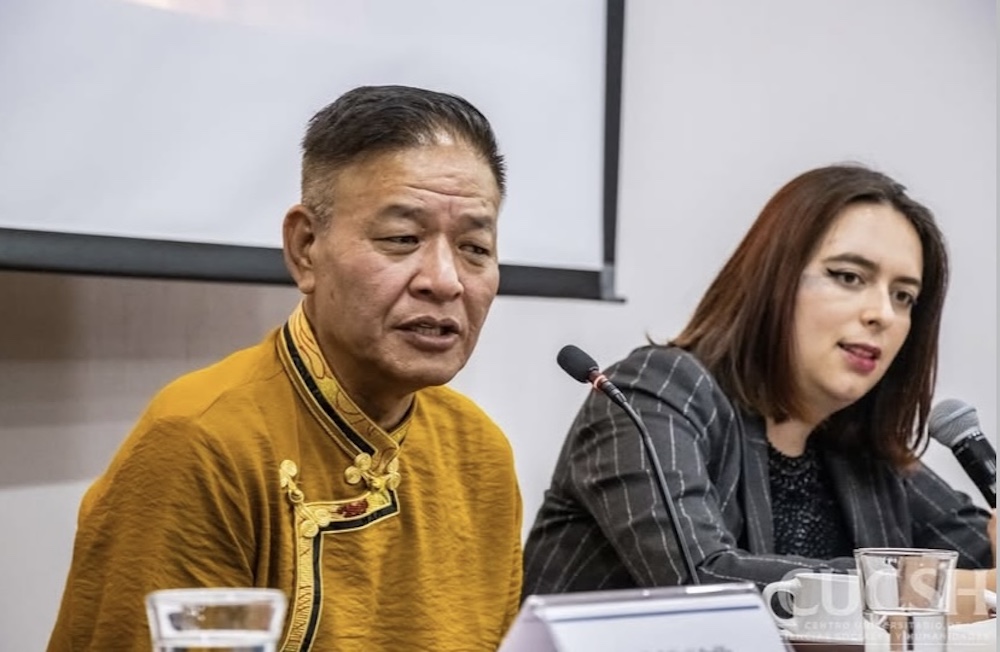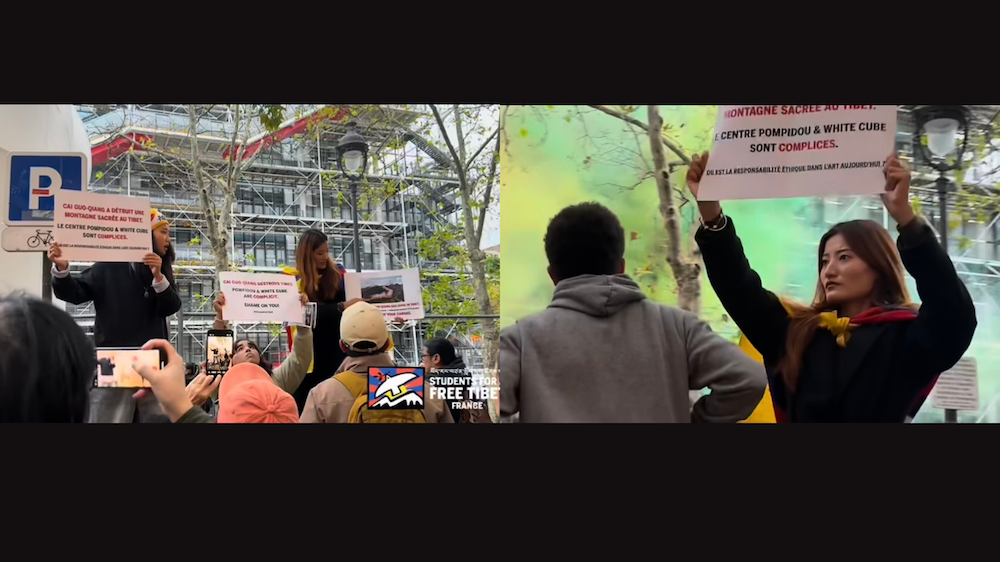By Krisy Gashler
ITHACA – From the home of Cornell University’s ROTC program, His Holiness the Dalai Lama spoke Tuesday afternoon about peace.
Five thousand people filled Barton Hall to capacity for the first of three public events in the Dalai Lama’s third visit to Ithaca.
“Genuine peace comes through inner peace,” he said. “Internally, (if you’re) full of hatred, full of suspicion, full of fear, then through that way, (it is) impossible to achieve genuine peace.”
The Dalai Lama blessed the Namgyal Monastery on Wednesday morning, an event closed to the press, and spoke to an audience of about 5,000 people at Cornell on Wednesday afternoon.
He has two more public events today: “Prayers for World Peace” at the State Theatre at 10 a.m., and “Eight Verses on Training the Mind” at Ithaca College at 2 p.m. Both events are sold out.
The Cornell event began with half an hour of chanting by the Namgyal Monastery monks, then brief remarks by Cornell President David Skorton.
Skorton said the Dalai Lama has “bridged the gap between religion and science” and “emphasizes the traits that unite us rather than those that divide us.”
The Dalai Lama began his speech by insisting on informality, saying that rather than refer to his audience as students, professors or university presidents, he preferred to call everyone “brothers and sisters.”
The Dalai Lama spoke as much as possible in English, but occasionally looked to his translator, Thubten Jinpa, for help thinking of a word or clarifying a point.
“As (a) Buddhist, my concern is (to) promote religious harmony,” he said. “Sometimes, religious faith is (a) source of human problems. That’s really unfortunate.”
He said that the fundamental basis of all religions is the same: to promote peace and happiness.
“Everybody really loves peace because everything, including these flowers, I think, should have some kind of right to survive, grow, blossom,” he said, pointing to the red and yellow mums surrounding the stage.
The Dalai Lama said the physical form of human beings lends itself to gentleness and compassion. Unlike other meat-eating animals, such as tigers or eagles, human bodies are not equipped with claws or fangs to help them kill their prey.
“I think our human body, in spite of aggressive mind, our human body is gentle,” he said.
He also explained the Buddhist belief about “secular ethics”
“Some of my friends believe ethics must be based on religious faith,” he said. “There must be moral ethics without religious belief.”
He said that as he uses the term, “secularism” does not mean rejection of religion, it means acceptance of all religious beliefs, including atheism.
“Respect all religions, no preference, equal to all religions, including nonbelievers,” he said.
He also emphasized the importance of affection, especially a mother’s affection, in developing human compassion. He particularly praised his own mother’s gentleness and affection while he was a child, and said it helped him to develop compassion as an adult.
“Constant news come from Tibet, and not happy ones, always sad,” he said. “During this difficult period, I think, compassion, which I learn from my mother, (is an) immense source of inner peace.”
He said that anger makes people irrational, and convinces them that their opponents are “very bad.”
“Ninety percent of that negativeness is mental projection,” he said. “Peace, like violence, is ultimately linked to our emotions.”
Despite horrible circumstances, the Dalai Lama said it is possible to achieve internal peace by working to solve problems that can be fixed, accepting and letting go of problems that cannot be fixed, and always remaining peaceful and compassionate toward self and others.
After roughly an hour of speaking, the Dalai Lama entertained questions. Skorton read from questions submitted by attendees when they bought tickets.
One question asked about Buddhist belief on the interplay between science and religion.
The Dalai Lama said Buddhists are charged to “respect scientific findings.”
If scientific discovery contradicts a scriptural teaching, the Dalai Lama said, “here you have to give greater credibility to the result of your investigation, rather than the scripture.”
This response prompted some scattered applause from the audience, which seemed to surprise the Dalai Lama. Through his translator, he explained further that Buddhists believe in three levels of reality.
The first level is things which are “obvious” and have no need to reason.
The second level is composed of knowledge that “through investigation, through reason, (one) can discover.”
The third level is knowledge that cannot be personally confirmed, but relies on the testimony of others.
“In some cases, we have to rely on Buddha’s own word,” he said. “There are sort of rules of faith, but these rules must combine with reasoning.”
When asked how young people can maintain hope in a world full of problems, the Dalai Lama responded that people should look holistically at problems, viewing them from multiple angles rather than focusing on just their own narrow perspective.
He also said reliance on drugs or alcohol to avoid or mask problems is “short-sighted” and “foolish.”
The Dalai Lama told his university audience that they could help alleviate inequality and suffering in developing countries by educating students from these countries.
“Bring or welcome more students from these poorer countries,” he said. “Give them vision, give them self-confidence, give them skill.”
He ended his speech by praising America’s Peace Corps, instituted under President John F. Kennedy.
“Instead of sending soldiers, send more students,” he said. “America (is) part of humanity, Africa, same human family. Brothers, sisters who have prosperity, go (to) these areas and bring more prosperity.”









